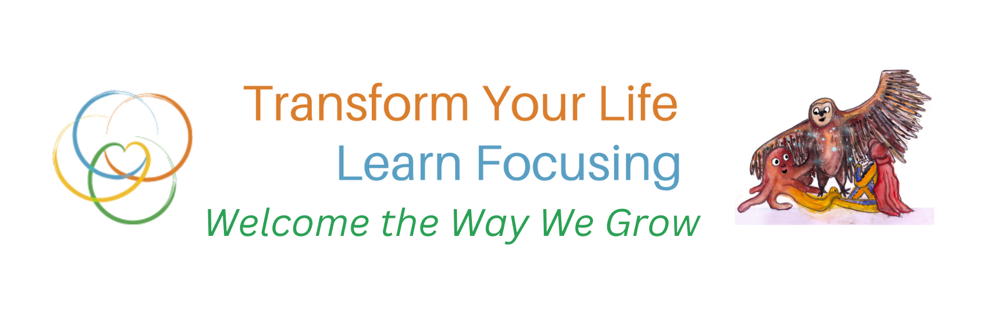
The second book I finished reading this weekend. It is called The Folio, A Journal for Focusing and Experiential Therapy. It is a series of articles primarily by Focusing Trainers around the world on the topic of Focusing and … Crossings and Integrations. And it is way cool as well!
Both of these books have inspired me to reconnect with what I am really wanting out of all that I went through to get certified and all the time I spend now in guided sessions or facilitating Focusing workshops. Here is what I came up with today: I want to thrive and be surrounded by communities that thrive. I want to live with all the aliveness my body provides and do this both from a sense of joyful freedom and boundaries that keep me safe. I want everyone in my communities to have access to experience, practice and learn Focusing if/when they desire.
The Folio has inspiring stories of what happens when we take the Focusing attitude we learn out into the world. I would like to share a few of them here. There is a story that community activists will relate to called Becoming Ok with the Not-Yet-Ok about taking our relational Presence skills to government board meetings, to corporate executives, to the media, and to organize our neighbors. It describes the experience of holding space for this all to move from Not-Yet-Ok toward Ok. And it covers knowing when it is time to step down and let others take it from here.

There are stories about integrating Focusing with teaching architecture, art therapies or being an artist. All of these are enriched through the Focusing understanding that there is no line of separation between our body and the universe, and that we influence and are influenced by all that is around us.
There are articles on crossing Focusing with Ken Wilbur’s Integral perspective, with Carl Jung’s work, with Marshall Rosenberg’s Non-Violent Communication, with Mindfulness work such as Jon Kabat-Zinn, with Spirituality and with New World Meditation techniques.
There is something called Recovery Focusing that was born in Costa Rica that combines Focusing with a traditional Twelve Step program. The author came to understand that the healing that happens in Focusing is due to the relating, not just the attending inside. “It is the interaction with another person itself that enhances the interaction with our own inner experiencing, opening up spaces that are not possible without that connection. As Gendlin maintains, during these human encounters, our responses interact with each other and carry forward our experiencing, bringing forth solutions that previously were not available” pg 61 Suzanne Noel.
There are more. I loved the article on Wholebody Focusing by Kevin McEvenue. I recently downloaded a bunch of articles from his website that I look forward to reading soon. He crossed The Alexander Technique with Focusing for “an experience of the body coming alive to itself, the instinctive body, the body of evolution, independent of me.” He also describes this bodily quality as “spontaneous inner-directed movements that seem to have a life all their own.” His story is a reminder that the Focusing attitude of open, curiosity grounded in compassion develops gradually and continues to invite us out into the world at our own pace with whoever or whatever we find in our environment that we want to relate with. With each relationship, a larger sense of our own Presence emerges.
The article that most hit home for me in terms of how I imagine our community growing is called ‘Community Wellness Focusing is Crossing and Collaboration’. This was written by two women who teach in the US, Pakistan and Afghanistan. They developed a technique I think is ingenious for applying Focusing to almost any community group. They began by helping the community ask themselves the following:
- What is the issue that the community wants to solve or heal
- What positive skills do they have
- What skills do they want to add to this
- What positive attitudes do they have
- What attitudes do they want to develop
Using Focusing techniques, they are able to get right to the core of a need. They boost their success by inviting community members to sense what they are already good at, and then move forward from this place that already feels some sense of thriving. One group of war-ravaged Afghans they worked with chose the ability to sleep at night without drugs as something they would like to improve. The facilitators taught them the single aspect of coming into their body and then noticing how their body feels when it learns to relax and find a safe place. This reminds me that sharing Focusing skills is not just about helping others become expert Focusers … little bits of the process can be all that is needed to bring about life forward movement.
Lastly, there is a story about Eco-Focusing that inspires me to explore this further in partnerships. In one sense, nature itself is a Focusing practitioner, echoing the elements of acceptance, filling us with curiosity to feel it, be in it, be part of, or witness to, the changes that occur in it.
Nature can be a partner, a background, a stage, a witness, a challenge. Watch for walk and talk exercises out in nature in advanced workshops. Here is a picture of my partner Bob Eco-Focusing at the Cascade Falls, VA – a spot very close to my Focusing heart:


Leave a comment: